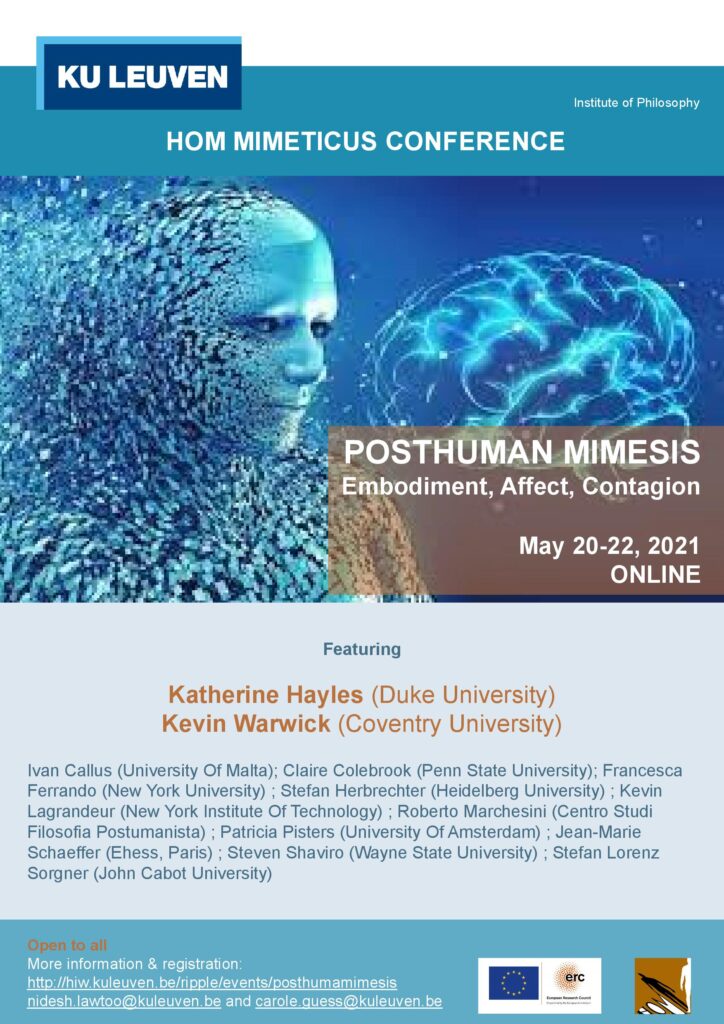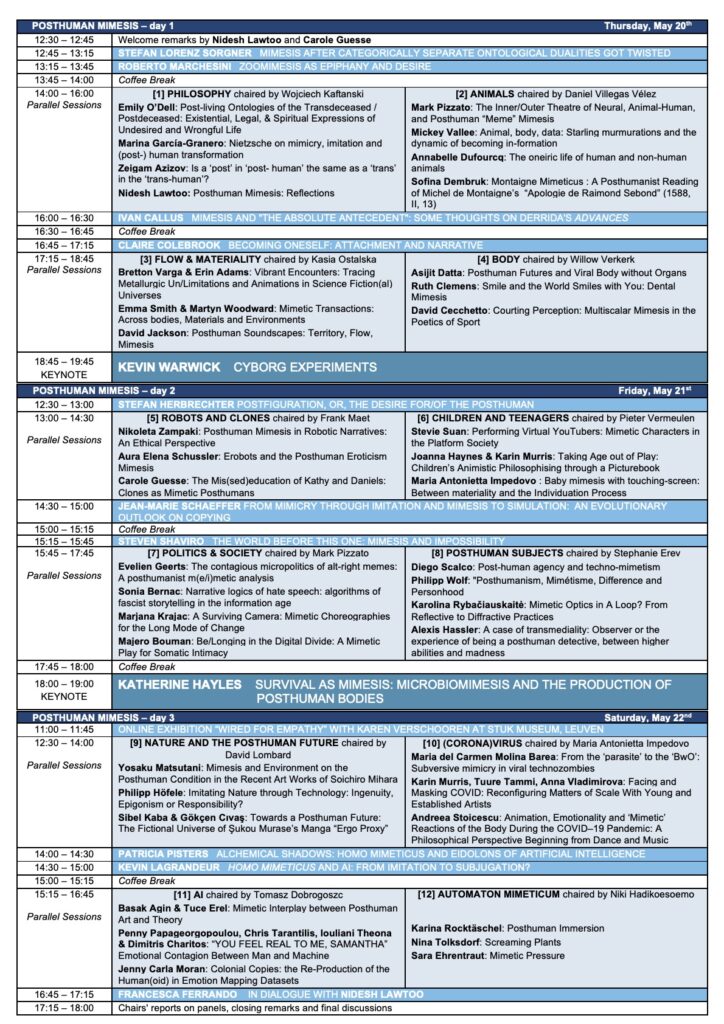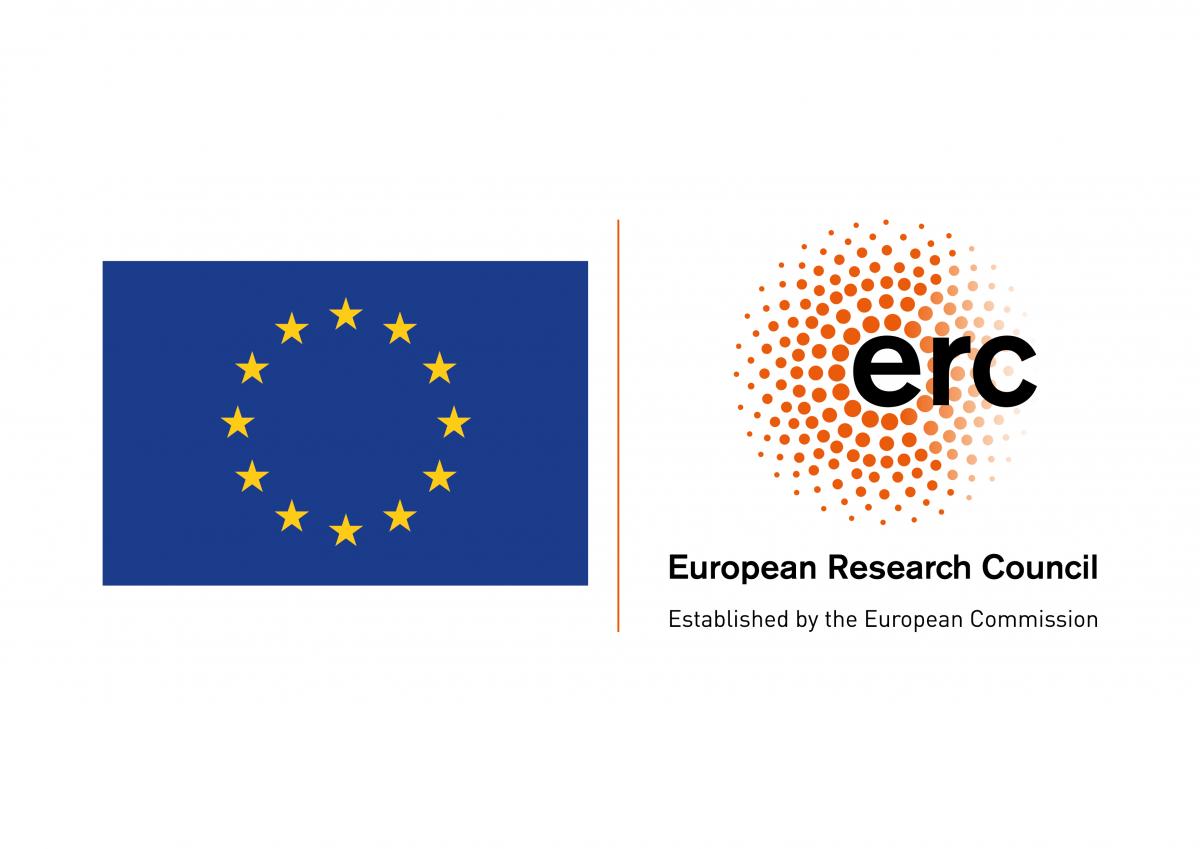
The ERC Project Homo Mimeticus: Theory and Criticism (http://www.homomimeticus.eu/) is pleased to announce an international online conference on the subject of “Posthuman Mimesis” hosted by the Institute of Philosophy at KU Leuven (Belgium). While the term “posthuman” covers a wide range of notions that account for the (bio-)technological modifications to the human body, consciousness and subjectivity, this conference focuses on the role imitation plays in the plastic transformations constitutive of the posthuman turn. Establishing a first bridge between major thinkers who accounted for “how we became posthuman” (Hayles) and a recent return of attention to behavioral imitation, this interdisciplinary conference proposes to look back to the ancient realization that humans are, for better and worse, mimetic creatures, in order to look ahead to protean transformations that transgress boundaries dividing mind from body, self from others, the human from the non-human and the non-living.
Rather than restricting the untranslatable concept of “mimēsis” to the sphere of aesthetic representation, or uploading posthuman consciousness in disembodied forms of hyperreal simulation, we invite contributors to engage with the protean powers of what we call, homo mimeticus – that is, immanent powers that stretch from imitation to identification, mimicry to influence, simulation to affective contagion, viral contagion to post-truth, plasticity to mirror neurons – all of which are constitutive of the mimetic turn, or re-turn of mimesis in critical theory. Our wager is that establishing a bridge between the posthuman turn and the mimetic turn during the COVID-19 crisis not only provides a dynamic theory for an increasingly digitized, yet still embodied, affective, relational, vulnerable and highly mimetic – or better, hypermimetic – subject prone to becoming other; it also traces how new technologies retroact, via feedback-loops, on posthuman subjectivity, generating both logical and pathological effects in need of critical diagnostics on technological affects—or techno-patho-logies.
Located at the transdisciplinary crossroads of posthuman studies, literary theory, film studies, cultural studies, science fiction studies, media studies, continental philosophy, and mimetic theory, the conference aims to promote a mimetic turn in posthuman studies.
Keynote I: Cyborg Experiments (Kevin Warwick)
Keynote II: Survival as Mimesis (Katherine Hayles)
PROGRAM & ABSTRACTS

Organizing committee
Prof. Nidesh Lawtoo, Dr. Carole Guesse, Niki Hadikoesoemo, members of the ERC project Homo Mimeticus (http://www.homomimeticus.eu/) at the Institute of Philosophy, KU Leuven, in collaboration with MDRN, the Research Group English Literature, and with the support of the European Research Council (ERC).
Format
Given the current uncertainties caused by changing Covid19 regulations, we are opting for an online format.
Indicative bibliography
- Braidotti, Rosi. The Posthuman. John Wiley & Sons, 2013.
- Ferrando, Francesca. Philosophical posthumanism. Bloomsbury Publishing, 2019.
- Gebauer, Gunter, and Christoph Wulf. Mimesis: Culture Art Society. U of California Press, 1995.
- Haraway, Donna. ‘A Manifesto for Cyborgs: Science, Technology, and Socialist Feminism in the 1980s’. The Haraway Reader, Psychology Press, 2004, pp. 7–46.
- —. Staying with the Trouble: Making Kin in the Chthulucene. Duke University Press, 2016.
- Herbrechter, Stefan, Ivan Callus and Rossini Manuela, eds. European Posthumanism. Routledge, 2016.
- Hayles, N. Katherine. How We Became Posthuman: Virtual Bodies in Cybernetics, Literature, and Informatics. University of Chicago Press, 1999.
- —. Unthought: The Power of The Cognitive Nonconscious. Chicago: The University of Chicago Press, 2017.
- Lawtoo, Nidesh. The Phantom of the Ego: Modernism and the Mimetic Unconscious. MSU Press, 2013.
- —. “The Plasticity of Mimesis,” MLN 132.5 (2017): 1201-1224.
- Nayar, Pramod K. Posthumanism. Polity, 2014.
- Potolsky, Matthew. Mimesis. Routledge, 2006.
- Schaeffer, Jean-Marie. Pourquoi la fiction? Le Seuil, 1999.
- Sorgner, Stefan. On Transhumanism. The Most Dangerous Idea in the World?! Pennsylvania State UP.
This project has received funding from the European Research Council (ERC) under the European Union’s Horizon 2020 research and innovation programme (grant agreement n°716181)

